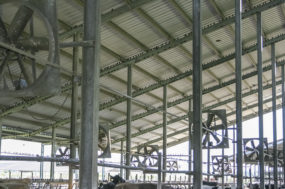As dairy farmers, we’re at the beginning of the food-production system. It’s our raw product that gets packaged by the manufacturers and shipped to the retailers before ending up in the hands of the consumer.
It’s gritty at our end. We get dirtier than the shop owners, and our income is less guaranteed than the factory worker. There are no paid vacations. We work harder. Maybe that’s why I did it – but probably not.
It was late in the night when I found them sitting at the edge of the lawn. I had just returned from my girlfriend’s apartment and planned on going to bed, but they offered me a beer and a spot next to them.
To my left was John – I changed his name to avoid jeopardizing his professional career. On the other side was Roland. That’s his real name, because I think he would like it that way.
They were students at the German college I taught at, studying to be middle-school teachers. In my mind it started like this: Roland leaned back in the grass and said, with a devilish smirk, “So I’ve been reading a lot about containering …”
Roland has long hair and smiles a lot. When asked a question, he considers it and gives it a thoughtful response. Containering, he explained, is liberating out-dated food that grocery stores throw into the dumpsters.
There is a lot of food that is discarded because it is past its expiration date but still perfectly good to eat. It’s about reducing waste. “It fits into my moral philosophy,” he said.
John is a member of the student government at the college. He is tall and thin with shortly cropped hair. He took lessons on how to find the ideal pitch for his voice in order to make his speech more effective. He was my out. “I’m in if John’s in,” I said.
We rode through the quiet streets of the small German town in the dark, old Turkish men watching us from the steps of their porch. My bike, borrowed from a soft-voiced co-ed, was pink and a little too small, making my knees stick out unnaturally. I was surprised, to say the least, that John had said yes.
The major grocery store at the bottom of town was our target. We coasted up to the back gates that secured its docking area. I had mixed emotions about finding it open.
The building was lighted. We watched the windows for shadows or movement as we leaned the bikes against the brick wall. John’s head turned side to side, continually sweeping the expanse of the parking lot as he shifted on his feet.
“Think we can make it to that creek bed over there if the cops come?” he asked.
We moved along the edges of the building, hoping to go unnoticed by the traffic that went by. We came upon a dumpster that was unlatched.
“Here we go,” Roland said, rubbing his hands. His eyes widened in anticipation.
It was empty.
“Well, we tried,” John said, but Roland was already gone, darting further into the property.
When we came upon him again, he was inside a compactor. He was on his hands and knees, staring at a blue plastic bag that stuck out of the collapsible gate.
“Ryan, look at this. Mechanically speaking, do you think I would get crushed?”
“For frick’s sake,” John yelled. “It’s just garbage!”
Roland eventually stood up and crossed his arms, following the hydraulics of the disposal system. That’s when he saw it.
The loading dock to the store was separated by a large fence that went nearly to the overhead ceiling. Behind it were piles of thrown-out food: skunky beer, watery jelly, broken packages of noodles, stale candy, old rolls. Roland clutched the fence and stared like a child in wonder. “There it is, boys,” he whispered. “Just waiting for us.”
I never say no to things. I don’t know why. Maybe it comes from a childhood of working on a farm and appreciating any chance to experience something new. Maybe it’s rebelling against some societal ideal of normalcy.
Maybe it’s just poor judgment. None of these reasons seemed like they would work with the cops. The facts were simple: I was risking my professional career, and perhaps legal residency, to steal expired food with college kids.
“Relax,” Roland said, looking me over. “We don’t do surveillance cameras in Germany.”
John left his lookout post to stand next to me and watch Roland scale the iron gate. At the very top, there was just enough space below the overhang to squeeze his body through once he had taken off his shirt.
John ran his fingers through his hair and continually repeated “oh my, oh my, oh my.”
“This is kind of breaking and entering,” I said.
Roland held out his hand and asked for a bag.
The old Turkish men were silent as we pedaled by, our bikes wobbling from the loads we carried. We dumped the stash on the kitchen table in the dormitory and spread it before us. Cake mix, gluten-free flour, an open bag of egg noodles.
There were 10 jars of mustard we divided among us, and we drank a beverage that was simply labeled, in English, “Red Juice” that actually appeared more light brown in a glass. We chewed hard toffee and then nearly choked on it when we laughed about the things we had done.
Did being a producer of food justify breaking the law to save it? Probably not. But for some reason, it was the best mustard I ever tasted. PD
Dennis is the son of a dairy farmer from western New York and a literary writer. The Dennis family dairies and maintains a 100-plus cow herd of Holsteins and Shorthorns.

-
Ryan Dennis
- Columnist
- Email Dennis




